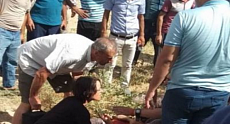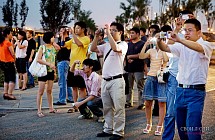Akezhan Kazhegeldin: KAZAKHSTAN TO FACE MOST SERIOUS CHALLENGES
-Why is it that the new PM was appointed at this very moment, when the national currency has just gotten drastically devaluated?
-I am absolutely sure that Nazarbayev, along with the rest of the Eurasian hemisphere, the majority of CIS countries and all of the CSTO partners, realised he had woken up in an entirely new geopolitical reality just as soon as “little green men” hit the land of Crimea. He knows that he is facing the most serious challenges since after early 1990s. Back then, we had no statehood, we had no institutions. Now, we have statehood, we have National Bank, we have a bunch of Ministries. However, up until now, the issue of how those institutions operate was of secondary importance. It is an issue of primary importance now.
These days, he understands that any instability and dissatisfaction of the masses is used primarily by internal forces in their fight against Nazarbayev. Those forces kept Zhanaozen protest alive for 7 months, painted a more optimistic version of the situation to the President and made him think that everything was under control, that overindulgent blue collar employees were just craving for even more than they already had. The President needs to prevent the social system fr om falling and the economy from stagnating. People need to see the economy growing.
Secondly, Nazarbayev has discovered that he had practically no army. He has finally sent the person he is sure about to handle that. That is, he knows that the person is not an alcoholic, that the person is highly disciplined and that the person is capable to stop corruption and to solve army’s problems. However, the biggest challenge is that the country, even after 23 years of its independence, needs to readdress the issues of its independence and geopolitics.
As our experience has shown, multi-vector world turned out to have just 3 directions. We need to choose between the West, the East and our eternal neighbour and ally – Russia. Our destiny for the next 100 years and whether or not we will stay independent is subject to the choice of direction we make today.
These tasks are not easy to tackle when Nazarbayev also needs to take care of domestic tasks and when people’s dissatisfaction is turned into leverage by different conflicting groups in different regions. There is very little time to get in parity with our partners and words are not enough. Loud speeches about eternal friendship and brotherhood do not work. There should be a serious geopolitical basis for one’s stability.
It is not possible to be strategic partners with the USA, Russia and China at the same time anymore. We can stick to the west when it comes to capital strategy, but we need to urgently choose who to stick to when it comes to geopolitics and security. Russia can’t sit there waiting for us to take a stance. After all, while we decide, it has 6 000 km of its southern borders essentially exposed. Russia wants to understand whether Kazakhstan is a close ally that is bounded by obligations or whether it is simply a good neighbour who wishes well but has its own goals. One can see that just by looking at how Russia behaves. However, it is up to Nazarbayev to face this challenge. Due to our political system, the PM has nothing to do with it. Yet, the President feels more comfortable with Karim Massimov by his side in these circumstances.
-Do you think that his return signifies revival of Chinese direction in our foreign policy after the relationships between Russia and the West “cooled down”?
-It would be a mistake to see someone’s appointment (granted, even the PM’s appointment) as a new foreign policy direction. Moreover, one needs to know China better. China’s main interest is China itself. Its strategy is to be at peace with its neighbour as far as there are domestic tasks to tackle. Special governmental body was set up by the new Chinese leadership to tackle one of the main tasks. This body is meant to conduct socio-economic and political reforms and will help their Politburo to overcome the resistance that is coming from regional, political and party elites. In a way, we have a similar problem in Kazakhstan, as we lost the system in which political institutions would counterbalance each other.
-What do you mean?
- Our political system is entirely built on appointees. People who are appointed as regional governors bring their entire teams with them. (Although I wouldn’t call it a team, it reminds more of a deck.) Then they will “feed off” the territory they are meant manage. As soon as people become rich, they start looking for some new heights of power. That is how they get involved with various political elites with a sole purpose of “pushing those who are in power”.
-After the Zhanaozen events and the strict measures that Atyrau regional management faced as the consequence, those forces have seemingly calmed down. However, these things cannot be completely burnt off. This is the fire that will start burning again, once even slow winds start blowing. However, we are not in a hurry to follow the example of new Chinese leadership yet. Even though there is little time left, I’d repeat.
Our economic situation is not as identical yet, but it is worsening. Once there are tasks to be tackled, it is customary to create bodies that would work on solutions. When Stalin needed a nuclear bomb, he created a body and put Beria in charge of it. No matter, what we think of Stalin or of Beria today, they did come up with the solution. It is a historical fact.
Chinese Communist Party leaders created a special body to manage the situation and regional elites a year ago. They have a well-functioning army and policy, they have party bodies, they even have autonomous regions. Nevertheless, Beijing understood well that local party bureaucracy is what holds back further development of economic reforms.
We have similar problems in Kazakhstan. However, it is not possible to put the source of the problem in charge of its solution! Our main difficulties don’t come from external enemies, they are not coming from the CIA or from the FSB, they are coming from our own bureaucratic apparatus. When we don’t have normal mechanisms for rotation, internecine wars are waiting to happen. One of such wars ended with a bloodshed in Zhanaozen. Let’s pray to God, this won’t happen again!
-While Ukrainian events were taking place, another interesting thing happened. That is, Ukrainian oligarch Dmitry Firtash was arrested. Was this noticed by oligarchs in Kazakhstan in any way?
-I am absolutely sure that the arrest and accounts of Ukrainian rich being frozen after Kyiv events have been worrisome for oligarchs across the CIS space. Simply because their net worth comes either from them being in power or them being partially in power. That is, when they are simultaneously in power and in business. The third option is when they are using the oligarchy as a leverage to influence those in power by sharing some of the assets with them. The main problem was that those people didn’t trust their country’s economy enough to return their assets to the country (perhaps, justifiably so). They didn’t return those assets even to reinvest in their own businesses.
It is well-illustrated by the way “Turan-Alem” (BTA –KazTAG) bank operates. Other banks operate similarly. It was believed for a long time that some extraordinary jurisdiction and offshore zones allow protection of transferred capital through complex trust system. However, those countries who suffered from the outflow of capital the most (such as the EU after the introduction of euro), have managed to find effective mechanisms against offshore zones. Not many people took notice of G7 (minus Russia) Finance Ministers meeting. They decided that the transactions of those in power are to be closely monitored.
A number of Presidents, PMs and people from their inner circles from all over the world have made it to the list. The list is long. Moreover, a prominent financier George Soros has been sponsoring “Global Witness” for a long time now. This NGO seeks for the links between natural resource companies and governments across the world that grant them concessions for exploration and development.
Moreover, journalists joined forces and started reporting on “white collar” crimes more frequently. Americans are at the forefront, as apart from the FBI, two other independent agencies monitor financial markets and uncover money-laundering-related violations.
The breakthrough happened when the US authorities started encouraging whistle blowers by rewarding their cooperation with 3% to 10% of confiscated capital. Several big cases, including one against Siemens, were filed after that. Superrich know about that, but they hope it will not affect them. At the same time, their assets are closely monitored and G7 countries along with the EU are aware of that.
Once the task to freeze accounts of those linked to the Kyiv events was set, it was executed overnight. It could happen in any country. That is why it is not a coincidence that Russian leadership gave an order to its superrich to reinvest in Russian economy and many of them really returned cash back to the country after selling their foreign assets. Although, this is not the best solution.
- What is the solution then?
-To make everyone return everything, some verbal calls are not enough. Trust is necessary. People transferred their money abroad for two reasons. They either did not have enough trust in domestic system or their money weren’t exactly clean. For the time being, some of the rich people prefer transferring money to different jurisdictions, from western ones to south eastern ones, instead of making them work for the benefit of domestic economy. They don’t understand that countries that have big money at their disposal and have the reserve currency status, hold a so-called currency jurisdiction over these kinds of transactions. The approach to hide quickly and easily may not work that brilliantly. However, I am not here to give away advice on how to act. I simply want to say that no single transaction can be easily hidden these days. Firtash in Ukraine and Rakhat Aliyev in Kazakhstan are cases in point. Those accounts are eventually found and the ways in which they were hidden are revealed. Then those accounts are frozen. It’s simply the question of time and occasion.
-The cases against Aliyev have been filed a long time ago. However, it seems to be that neither the USA nor the EU are in a hurry to bring them to a close?
-Firtash is under investigation in the US for a few years now. However, the speed with which he was arrested and the speed with which his accounts were frozen can be attributed to the situation in Ukraine. The Aliyev case is typical, but distinctly different. There are two cadences here. While serving as an ambassador to Austria, he effectively utilised his contacts, lawyers from all over the world and Austrian political system. He turned a number of prominent political figures and other politically influential personalities into his hostages. No matter how they choose to behave now, they are at risk of compromising themselves. The case is handled with a rather wishy-washy attitude. The local authorities did everything they could to make him leave to Malta. This time, Malta’s authorities are doing everything they can to make him go away, while leaving his frozen assets behind. This is what Western governments are very much up to. Although, money allows one to lead this kind of lifestyle for a long time.
Rofik Sotkimbayev, who is now deceased, complained to me once that he cannot understand Austrian legal authorities. As his fellow countryman, I felt his pain and gave him an advice. I explained to him how to revisit the case, how to address Kazakhstan authorities once again, how to urge them to file the case against those who were chasing him and how to find the right lawyers in each country wh ere that individual allegedly had assets. All of it has brought some results into being. Even though, as I understand, Sogimbayev didn’t live long enough to see the result.
Those who try to artificially prolong previously mentioned investigations are hoping that former Presidential Security service officers Afanasenko and Ibrayev and widows of murdered “NurBank” managers will not have enough patience to see it coming to a close. As for the EU itself, this investigation illustrated that legal system can malfunction and be ineffective even in democratic countries.
-Does it mean tha Altynbek Sarsenbayev’s relatives and those who are trying to find Rakhat Aliyev, shouldn’t be joining forces with those you’ve just mentioned?
-I want to assure relatives of the deceased, Altynbek Sarsenbayev, that I am ready to help them join the case. It is necessary to correctly address relevant Kazakhstan authorities first. This would give his relatives an opportunity to finally take hold of documentation. That would allow them to make their own conclusions. I am calling for his relatives to at least file the case against Mister Aliyev, so that Altynbek’s children are provided for through some financial reimbursement. There is an entire list of Aliyev’s frozen assets and property in existence.
-Does it mean that while seeking for justice in Europe, Kazakhstan’s plaintiffs still need to rely on our own prosecutors to some extend?
-It is necessary to utilise them for building a good case in the West. Not more than that. It is dependent on how selective and competent the prosecutor is. Let’s consider this situation from a different vantage point. Kazakhstan’s authorities themselves ask their western colleagues for assistance every now and then, especially when we are talking about such cases as the Aliyev’s case. However, they cannot count on the right kind of attitude towards these requests as long as they clearly have selective approach in their judicial system.
I know that Afanasenko’s and Ibrayev’s lawyers have requested Kazakhstani authorities to revisit their cases. I also know that the prosecutor’s office was asked to revisit my own case and verdict. My case clearly illustrates how evidence is fabricated. That is when some real documents disappear from certain folders. However, the process has not been moving much.
I am sure that Kazakhstan will need to ask Europe for legal assistance many times. No lobbyists, no former PMs or Ministers will be able to help in Europe, as such attempts may be accompanied by the loss of freedom. As long as the approach and internal procedures remain unchanged and selectivity is still in place, it is not possible to expect any support from the government.


